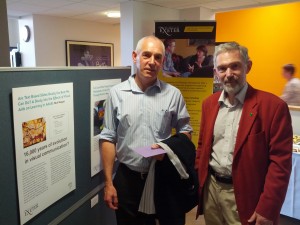The Open Access Research and Research Data Management Policy for PGR Students has now been approved by the Board of the Faculty of Graduate Research.
The policy will be implemented in two stages:
- PGR students who are funded by RCUK should comply with this policy with regards to research papers submitted for publication from 1st April 2013.
- All PGR students should comply with this policy from 1st October 2013 with regards to research papers and research data.
The following links provide further help and guidance on Open Access and research data management for PGR students and their supervisors:
- Open Access guide for PGRs
- Guide for PGRs on how to deposit a copy of research paper in the institutional repository
- A draft guidance document for the research data management elements of the policy is available.
- A presentation about the new policy is available here.
Further help and advice is available via the Open Access and Data Curation Team on or .


 On Friday 25th May, the winners for the Images of Research 2012 competition were announced. The competition was run jointly by the Library and Employability & Graduate Development and was open to all postgraduate researchers. It aimed to highlight the wide range of research that is taking place at the university, using images to look at that research in a new and exciting way. There were three categories and a winner was selected in each by our panel of judges.
On Friday 25th May, the winners for the Images of Research 2012 competition were announced. The competition was run jointly by the Library and Employability & Graduate Development and was open to all postgraduate researchers. It aimed to highlight the wide range of research that is taking place at the university, using images to look at that research in a new and exciting way. There were three categories and a winner was selected in each by our panel of judges. If you need help with finding resources either in the library or online then the person to turn to is your Subject Librarian.
If you need help with finding resources either in the library or online then the person to turn to is your Subject Librarian.